

List Of Illegal Drugs. What are Illegal Drugs?
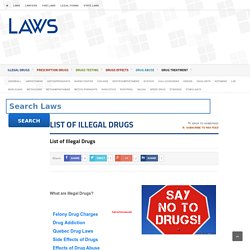
Illegal drugs are substances, which an individual, by law, is not allowed to possess, use or distribute. Federal drug policy of the United States. Drug use has increased in all categories since the beginning of prohibition on January 17, 1920,[1] with the exception of opium; its use is at a fraction of its peak level.
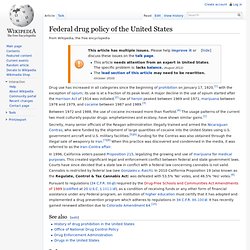
A major decline in the use of opium started after the Harrison Act of 1914 was initiated.[2] Use of heroin peaked between 1969 and 1971, marijuana between 1978 and 1979, and cocaine between 1987 and 1989.[3] Between 1972 and 1988, the use of cocaine increased more than fivefold.[4] The usage patterns of the current two most culturally popular drugs: amphetamines and ecstasy, have shown similar gains.[1] See also[edit] References[edit] External links[edit] Office of National Drug Control Policy. Prescription Drug Abuse Prescription drug abuse is the Nation's fastest-growing drug problem and has been classified as an epidemic by the Centers for Disease Control and Prevention.
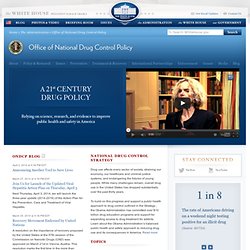
Learn more about this public health threat and comprehensive, government-wide actions being taken by the Administration to reduce prescription drug abuse. Legal. As of July 1, 2013 ThinkQuest has been discontinued.
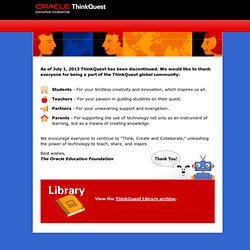
We would like to thank everyone for being a part of the ThinkQuest global community: Students - For your limitless creativity and innovation, which inspires us all. U.S. Leads The World In Illegal Drug Use. Despite tough anti-drug laws, a new survey shows the U.S. has the highest level of illegal drug use in the world.
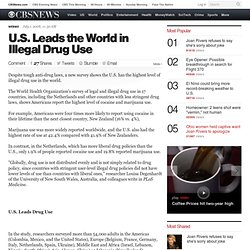
The World Health Organization's survey of legal and illegal drug use in 17 countries, including the Netherlands and other countries with less stringent drug laws, shows Americans report the highest level of cocaine and marijuana use. For example, Americans were four times more likely to report using cocaine in their lifetime than the next closest country, New Zealand (16% vs. 4%), Marijuana use was more widely reported worldwide, and the U.S. also had the highest rate of use at 42.4% compared with 41.9% of New Zealanders.
In contrast, in the Netherlands, which has more liberal drug policies than the U.S., only 1.9% of people reported cocaine use and 19.8% reported marijuana use. U.S. National Drug Policy: United States of America. Appendix 2 State by State List of Marijuana Penalties([43]) The following guide lists penalties for some, but not all, state marijuana offences.
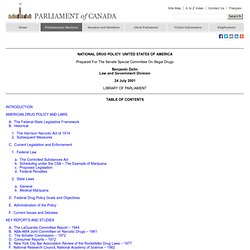
“Possession” in this appendix refers to possession for personal use. Penalties for possession with intent to traffic, distribute or sell will result in more significant sentences. Medical marijuana exemptions are discussed in the main body of this paper. “C” – Conditional Release. Illegal Drugs in America: A Modern History. Since the 19th century when Americans first discovered new wonder drugs like morphine, heroin, and cocaine, our society has confronted the problem of drug abuse and addiction.
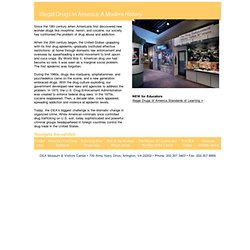
When the 20th century began, the United States--grappling with its first drug epidemic--gradually instituted effective restrictions: at home through domestic law enforcement and overseas by spearheading a world movement to limit opium and coca crops. By World War II, American drug use had become so rare, it was seen as a marginal social problem.
Drugs and the law. The law on drugs is complex.
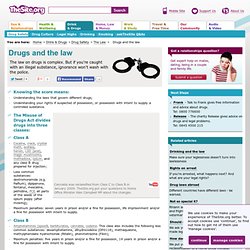
But if you're caught with an illegal substance, ignorance won't wash with the police. Knowing the score means: Understanding the laws that govern different drugs;Understanding your rights if suspected of possession, or possession with intent to supply a controlled substance. Cannabis was reclassified from Class C to Class B in January 2009. TheSite.org put your questions to Home Office Minister Alan Campbell MP about the changes. Withdrawal Symptoms for Drug and Alcohol Addiction: Physical, Emotional. Withdrawal occurs because your brain works like a spring when it comes to addiction.
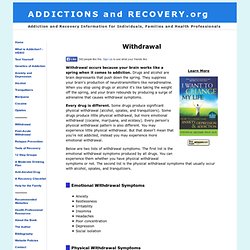
Drugs and alcohol are brain depressants that push down the spring. They suppress your brain's production of neurotransmitters like noradrenaline. Process Addiction - Rehab Info. Don't let a behavioral disorder, process addiction or mental problems tear apart your life or your family.
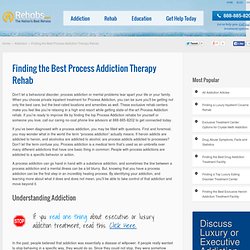
When you choose private inpatient treatment for Process Addiction, you can be sure you'll be getting not only the best care, but the best-rated locations and amenities as well. These exclusive rehab centers make you feel like you're relaxing in a high end resort while getting state-of-the-art Process Addiction rehab. If you're ready to improve life by finding the top Process Addiction rehabs for yourself or someone you love, call our caring no-cost phone line advisors at 888-885-8202 to get connected today. If you’ve been diagnosed with a process addiction, you may be filled with questions. Process of Drug Addiction Rehabilitation - Alcohol Rehabilitation Help.
Financing Learn about addiction treatment financing. Far too many people do not seek out addiction rehabilitation simply because they are intimidated by the recovery process. It is likely that if these men and women knew more about the inner workings of addiction treatment facilities they would come to understand the healing and help that goes on there – and be more likely to enroll themselves or their loved ones into rehab. In an effort to provide clarity on this very important subject, the following information answers many of the basic questions that individuals have about addiction rehabilitation.
The Primary Steps Although every addiction rehabilitation program has a different philosophy regarding treatment and care, there are three processes which play a role in almost every drug or alcohol rehab center in the United States: detox, counseling and aftercare. Reliable information addiction and rehab. Drug Addiction vs Process Addiction. Process Addiction is a relatively new way of describing an addiction to an activity, or a process, that does not involve taking brain-affecting substances such as cannabis, alcohol, cigarettes or hard drugs. The Most Addictive Drugs in the World. Many people think that heroin is the most addictive drug in the world. The truth is, that although heroin is one of the most dangerous drugs in the world, it is NOT the most addictive.
You may be surprised to learn that some of the drugs the experts have found to be most addictive are actually legal. The most addictive drugs Nicotine. Although studies vary, it is generally believed that over 30% of those individuals who use nicotine for a period of time become addicted. What is rehab? With a new star 'checking in' to rehab every other week, TheSite.org decided to find out what all the fuss is about. What is rehab? 'Rehab' usually refers to a person being placed in a residential rehabilitation unit, but it can also refer to 'out patient' treatment, support groups and care centres.
Drug Laws and Drug Crimes. Drug laws and drug crimes have gotten lots of attention in the past decade. Laws in every state and at the federal level prohibit the possession, manufacture, and sale of certain controlled substances -- including drugs like marijuana, methamphetamine, ecstasy, cocaine, and heroin. (For more on a related topic, see Substance Abuse Treatment for Defendants Facing Drug and Other Charges.) Putting aside political arguments over the so-called "war on drugs," it isn't hard to see why controlled substances are the focus of so much attention from legislators and law enforcement. It's estimated that drug and alcohol abuse costs society over $110 billion a year -- through accidental death and injuries, health care, dependency treatment, criminal behavior, and more. (To read about a shift in the federal government’s approach to drug crime under President Obama, see the blog post Morally Mandatory.)
Laws for illegl drug uses. Notes Research.